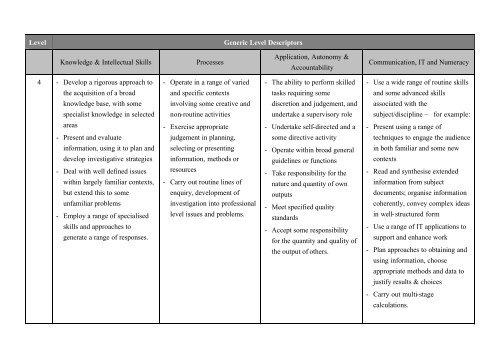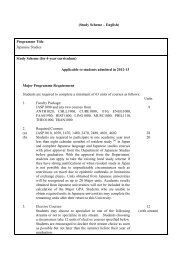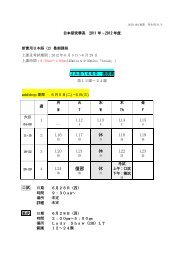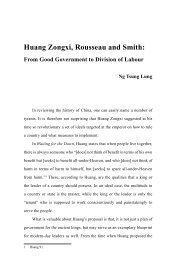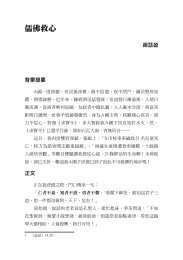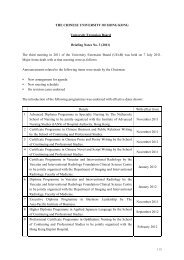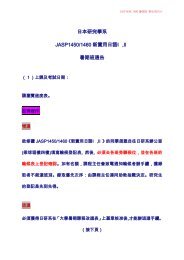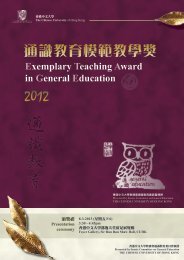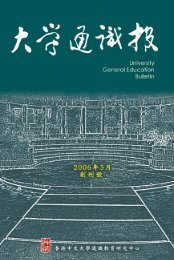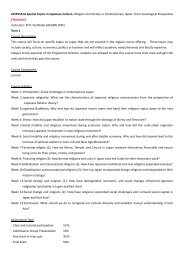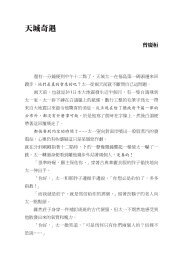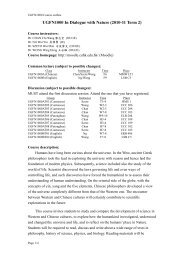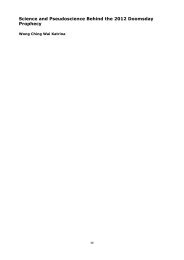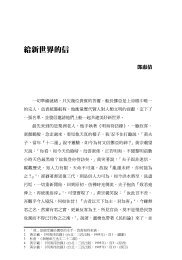Level Generic Level Descriptors Knowledge & Intellectual Skills ...
Level Generic Level Descriptors Knowledge & Intellectual Skills ...
Level Generic Level Descriptors Knowledge & Intellectual Skills ...
Create successful ePaper yourself
Turn your PDF publications into a flip-book with our unique Google optimized e-Paper software.
<strong>Level</strong><br />
<strong>Generic</strong> <strong>Level</strong> <strong>Descriptors</strong><br />
<strong>Knowledge</strong> & <strong>Intellectual</strong> <strong>Skills</strong><br />
Processes<br />
Application, Autonomy &<br />
Accountability<br />
Communication, IT and Numeracy<br />
4 - Develop a rigorous approach to<br />
- Operate in a range of varied<br />
- The ability to perform skilled<br />
- Use a wide range of routine skills<br />
the acquisition of a broad<br />
and specific contexts<br />
tasks requiring some<br />
and some advanced skills<br />
knowledge base, with some<br />
involving some creative and<br />
discretion and judgement, and<br />
associated with the<br />
specialist knowledge in selected<br />
non-routine activities<br />
undertake a supervisory role<br />
subject/discipline — for example:<br />
areas<br />
- Exercise appropriate<br />
- Undertake self-directed and a<br />
- Present using a range of<br />
- Present and evaluate<br />
judgement in planning,<br />
some directive activity<br />
techniques to engage the audience<br />
information, using it to plan and<br />
develop investigative strategies<br />
- Deal with well defined issues<br />
within largely familiar contexts,<br />
but extend this to some<br />
unfamiliar problems<br />
- Employ a range of specialised<br />
skills and approaches to<br />
generate a range of responses.<br />
selecting or presenting<br />
information, methods or<br />
resources<br />
- Carry out routine lines of<br />
enquiry, development of<br />
investigation into professional<br />
level issues and problems.<br />
- Operate within broad general<br />
guidelines or functions<br />
- Take responsibility for the<br />
nature and quantity of own<br />
outputs<br />
- Meet specified quality<br />
standards<br />
- Accept some responsibility<br />
for the quantity and quality of<br />
the output of others.<br />
in both familiar and some new<br />
contexts<br />
- Read and synthesise extended<br />
information from subject<br />
documents; organise information<br />
coherently, convey complex ideas<br />
in well-structured form<br />
- Use a range of IT applications to<br />
support and enhance work<br />
- Plan approaches to obtaining and<br />
using information, choose<br />
appropriate methods and data to<br />
justify results & choices<br />
- Carry out multi-stage<br />
calculations.
<strong>Level</strong><br />
<strong>Generic</strong> <strong>Level</strong> <strong>Descriptors</strong><br />
<strong>Knowledge</strong> & <strong>Intellectual</strong> <strong>Skills</strong><br />
Processes<br />
Application, Autonomy &<br />
Accountability<br />
Communication, IT and Numeracy<br />
3 - Apply knowledge and skills in a<br />
- Operate in a variety of<br />
- The ability to perform tasks in<br />
- Use a wide range of largely<br />
range of activities,<br />
familiar and some unfamiliar<br />
a broad range of predictable<br />
routine and well practiced<br />
demonstrating comprehension<br />
contexts, using a known range<br />
and structured contexts which<br />
skills — for example:<br />
of relevant theories<br />
- Access, organise and evaluate<br />
information independently and<br />
make reasoned judgements in<br />
of technical or learning skills<br />
- Select from a considerable<br />
choice of predetermined<br />
procedures<br />
may also involve some<br />
non-routine activities<br />
requiring a degree of<br />
individual responsibility<br />
- Produce and respond to detailed<br />
and complex written and oral<br />
communication in familiar<br />
contexts, and use a suitable<br />
relation to a subject or<br />
discipline<br />
- Employ a range of responses to<br />
- Give presentations to an<br />
audience<br />
- Engage in self-directed<br />
activity with<br />
guidance/evaluation<br />
structure and style when writing<br />
extended documents.<br />
- Select and use standard<br />
well defined, but sometimes<br />
- Accept responsibility for<br />
applications to obtain, process<br />
unfamiliar or unpredictable,<br />
quantity and quality of output<br />
and combine information<br />
problems<br />
- Accept well defined but<br />
- Use a wide range of numerical<br />
- Make generalisations and<br />
limited responsibility for the<br />
and graphical data in routine<br />
predictions in familiar contexts.<br />
quantity and quality of the<br />
contexts, which may have some<br />
output of others<br />
non-routine elements.
<strong>Level</strong><br />
<strong>Generic</strong> <strong>Level</strong> <strong>Descriptors</strong><br />
<strong>Knowledge</strong> & <strong>Intellectual</strong> <strong>Skills</strong><br />
Processes<br />
Application, Autonomy &<br />
Accountability<br />
Communication, IT and Numeracy<br />
2 - Apply knowledge based on an<br />
- Choose from a range of<br />
- The ability to perform a range<br />
- Use skills with some<br />
underpinning comprehension in<br />
procedures performed in a<br />
of tasks in predictable and<br />
assistance — for example:<br />
a selected number of areas<br />
- Make comparisons with some<br />
number of contexts, a few of<br />
which may be non-routine<br />
structured contexts<br />
- Undertake directed activity<br />
- Take active part in discussions<br />
about identified subjects<br />
evaluation and interpret<br />
available information<br />
- Co-ordinate with others to<br />
achieve common goals.<br />
with a degree of autonomy<br />
- Achieve outcomes within time<br />
- Identify the main points and ideas<br />
from documents and reproduce<br />
- Apply basic tools and materials<br />
constraints<br />
them in other contexts<br />
and use rehearsed stages for<br />
solving problems.<br />
- Accept defined responsibility<br />
for quantity and quality of<br />
- Produce and respond to a<br />
specified range of written and oral<br />
- Operate in familiar, personal<br />
output subject to external<br />
communications, in<br />
and/or everyday contexts<br />
quality checking.<br />
familiar/routine contexts<br />
- Take account the identified<br />
- Carry out a defined range of tasks<br />
consequences of actions.<br />
to process data and access<br />
information<br />
- Use a limited range of familiar<br />
numerical and graphical data in<br />
everyday contexts<br />
- Carry out calculations, using<br />
percentages and graphical data to<br />
given levels of accuracy.
<strong>Level</strong><br />
<strong>Generic</strong> <strong>Level</strong> <strong>Descriptors</strong><br />
<strong>Knowledge</strong> & <strong>Intellectual</strong> <strong>Skills</strong><br />
Processes<br />
Application, Autonomy &<br />
Accountability<br />
Communication, IT and Numeracy<br />
1 - Employ recall and demonstrate<br />
- Operate mainly in closely<br />
- The ability to perform tasks of<br />
- Use very simple skills with<br />
elementary comprehension in a<br />
defined and highly structured<br />
routine and repetitive nature<br />
assistance — for example:<br />
narrow range of areas with<br />
dependency on ideas of others<br />
contexts<br />
- Carry out processes that are<br />
given clear direction<br />
- Carry out directed activity<br />
- Take some part in discussions<br />
about straightforward subjects<br />
- Exercise basic skills<br />
repetitive and predictable<br />
under close supervision<br />
- Read and identify the main points<br />
- Receive and pass on<br />
- Undertake the performance of<br />
- Rely entirely on external<br />
and ideas from documents about<br />
information<br />
clearly defined tasks<br />
monitoring of output and<br />
straightforward subjects<br />
- Use, under supervision or<br />
- Assume a strictly limited<br />
quality<br />
- Produce and respond to a limited<br />
prompting, basic tools and<br />
range of roles.<br />
range of simple, written and oral<br />
materials.<br />
communications, in<br />
- Apply learnt responses to solve<br />
familiar/routine contexts<br />
problems<br />
- Carry out a limited range of<br />
- Operate in familiar, personal<br />
and/or everyday contexts<br />
simple tasks to process data and<br />
access information<br />
- Take some account, with<br />
prompting, of identified<br />
consequences of actions.<br />
- Use a limited range of very<br />
simple and familiar numerical and<br />
pictorial data<br />
- Carry out calculations, using<br />
whole numbers and simple<br />
decimals to given levels of<br />
accuracy.


